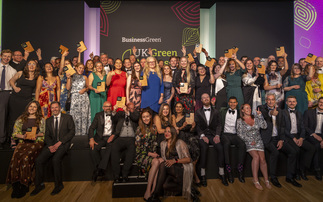
Credit: Osborne Clarke
Ahead of the company's sponsorship of the UK Green Business Awards, Osborne Clarke partner and UK head of decarbonisation James Watson talks to BusinessGreen about how he built his career as a renewable energy lawyer and the achievements he's most proud of
James Watson is a partner and UK head of decarbonisation at Osborne Clarke, where he is also co-head of the legal company's international environmental, social and governance (ESG) practice. Boasting over 20 years' experience as a transactional renewable energy lawyer, he helps support innovation and transformation in the energy and utilities sector, providing advice to investors, funds, banks, developers and more involved in renewables, in addition to helping shape and implement clients' ESG strategies. His areas of expertise include providing advice on greenwashing claims, sanctions risk, sustainability due diligence compliance, voluntary carbon markets, product labelling, and mandatory sustainability reporting, among others.
BusinessGreen: What was your first role in the green economy and what attracted you to the sector?
I first became involved in the green economy when I was working on some major energy-from-waste projects in the mid-2000s.These included the Manchester waste PFI. This was the first set of projects I worked on where the local procuring authority saw value in extracting recyclates from general waste. The project also involved producing heat from the waste that was eventually incinerated for use in industrial processes and domestic heating.
The ability of green and circular economy projects to divert, re-use and add value to items that had been discarded and were previously considered worthless stuck with me. That was a key factor that informed my decision to get involved in similar projects.
What parts of the green economy are you most excited about?
I'm excited about the increasing role of data and machine learning to drive efficiencies in the transition to net zero. As regulation targeted at driving (and recording) net zero among UK entities increases, the efficient collection, processing and application of data will be hugely important in ensuring regulatory compliance and overall efficiency in the changes that are needed in order to meet the target. I am particularly interested in supporting emerging tech start-ups which are developing the tools and software platforms that the wider economy is going to need to not only reach net zero, but also provide evidence that it has been reached.
What developments do you think are currently under the radar?
The creation of a distributed power grid, where locally generated renewables are used locally, is not currently getting enough attention. The localisation of the grid will be an increasing feature of electricity distribution across most countries as we transition to net zero, and local renewables will comprise a growing proportion of the energy mix in place of large-scale fossil fuel generation. This area has however been historically underfunded and will need a significant new regulation in order to make it happen.
What is the biggest misconception about the green economy?
I feel that the biggest misconception is that people participate in the green economy for purely moral and ethical reasons, and not simply because it is profitable. While a belief in the global and societal benefits of net zero is important to ensure passion and authenticity, the reality is that the sector provides significant investment opportunities. Private investment is an essential component of reaching net zero targets, and that won't be forthcoming if there is no profit case. The misconception that green investment comes at the expense of investor returns can be a damaging one.
What do you see as the biggest challenges to the net zero transition?
Political uncertainty represents a significant obstacle to the net zero transition. As with any growth area, political instability and shifting government policy has a significant impact on investor confidence. With green policy continuing to be a hot (and often controversial) topic, this presents a real threat to the injection of private sector capital that is needed to reach global net zero targets. Political stability can often be even more important than a favourable policy background if that background is constantly shifting.
What advice would you give to someone looking to work in the green economy?
I think that an underlying interest in net zero and decarbonisation is hugely important for anyone thinking of working in the green economy. As with any career, having that baseline interest and passion in the provides the motivation and commitment which are necessary for long-term success. It is also crucial in ensuring the authenticity of what you are saying to clients and colleagues – particularly in a growth area such as the green economy.
Your Osborne Clarke colleague Matt Germain is a finalist at this year's UK Green Business Awards - can you tell us a little bit about the company's work to advance the green economy?
As lawyers we've really grasped the nettle when it comes to looking at our own impact and how we hold ourselves accountable. We were one of the first organisations to have a verified net zero target of 2040 in line with the SBTi Net Zero Standard, which is something the firm and everyone in it is extremely proud of, and I think really proves our level of commitment to facilitating the transition to a low-carbon future.
We've rolled out carbon literacy training to all of our people, have a brilliant employee-led sustainability forum, and have a dedicated sustainability steering group that reports into the executive board and keeps a check on our carbon reduction progress. I'm very proud to be a part of a firm that has recognised its responsibility to take action against the climate crisis, and is bringing its people on that journey with them.
What projects or achievements are you most proud of?
I am particularly proud of the breadth of the green economy transactions that we have supported. While our track record in technologies such as solar and wind power generation is long-standing, we are strategically looking to target emerging areas that move the economy towards net zero so that we can remain at the forefront.
To that end, we have worked on a number of exciting projects involving technologies such as hydrogen, battery storage, EV charging, heat pumps and voluntary carbon market projects (such as a recent at-scale grassland restoration project in the United States). It is really exciting to be able to support these types of projects for a great mix of clients which enable us to be involved in the types of advancements that are necessary in order to reach net zero.
What can the green economy do to better promote its successes?
The green economy has much to be proud of in terms of the innovative solutions devised to help reduce the negative impact of man's activity on the planet. But sometimes I feel it's a little shy at talking about the revenue which can be made in inventing a ground breaking product or solution and then scaling that up to make profit for its backers and investors. There is obviously risk in investing in theoretical solutions. But there are many companies, funds and governments who will take that risk if they can see profit potential. I think we should all be more open about that.
What would your green superpower be?
The power of foresight on the future of green technology. The established technology capabilities that are currently available to us will only get us so far on the journey to net zero. Emerging technologies in areas such as carbon extraction have a crucial role to play and it would be fantastic to know what the successful technologies will be!
James Watson is a partner and UK head of decarbonisation at Osborne Clarke.
Osborne Clarke is sponsor of the Nature Based Project of the Year award category at the UK Green Business Awards 2024, which will take place on the evening of 12 June at The Brewery in London. You can reserve your place at the awards here.







